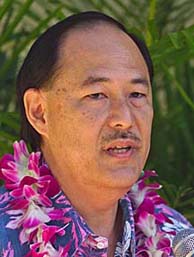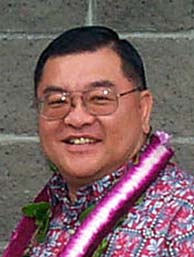
Governor omitted
key chapters in her
story of 2004 session
Governor Lingle's essay in the Insight section of last Sunday's Star-Bulletin contained a good deal of misleading information. She (or her staff) got a little carried away in an attempt to make Democrats look like the bad guys. The public deserves to know the truth, so let's look at some things the governor didn't tell us in her essay.
|
What she didn't say: The governor failed to mention that fiscal year 2002 included Sept. 11, 2001, the day terrorists hijacked four U.S. airliners and slammed them into the World Trade Center, the Pentagon and a Pennsylvania field. That event crippled Hawaii's economy, causing a dramatic drop in tax revenues and the subsequent deficit. The recovery we've seen since then is due in large part to the emergency measures enacted during the Special Session of 2001 and Regular Session of 2002 (prior to Governor Lingle assuming office).
>> The governor said: "Hawaii has experienced a dramatic economic turn-around ... We leapfrogged from 29th place in economic momentum to eighth place between June 2001 and June 2004, according to Governing Magazine."
What she didn't say: Despite the effects of 9/11, Hawaii's economic momentum actually went from 29th place in June 2001 to second in June 2003 (a timeframe that included 18 months of the Cayetano administration and only the first six months of Governor Lingle's tenure). Under Governor Lingle's administration, from June 2003 to June 2004, Hawaii's ranking actually dropped from second to eighth. (Source: Governing Magazine: Sourcebook 2003 and 2004)
>> The governor said: "In fiscal year 2006, we will face an estimated deficit of $197 million because of massive increases in debt service brought on by previous debt restructuring plans, increased contributions to the state retirement system and increases in employee wages."
What she didn't say: The state's past debt restructuring took advantage of incredibly low interest rates and was done by jurisdictions across the country to reduce costs. In fact, the Lingle administration initiated a large debt restructuring a year ago for the same reason. The governor knows that doing so pushes debt service obligations into the future, yet she did it, too.
In addition, the increased contributions to the retirement system are a direct result of two major factors -- investment performance and an increase in wages. The stock market went through several years of poor performance, which no one could control, and the Legislature does not control the pay raises negotiated by the governor. To blame Democratic lawmakers for these factors is simply misleading.
>> The governor said: "The Democrats who want me to open the spending floodgates are the same legislators who have raided $156 million from the Highway Fund since 1996. Our state receives a four-to-one federal match on highway funds, so we lost $624 million."
What she didn't say: In the last two years the governor herself has requested the Legislature's agreement to transfer more than $55 million from various special funds to the general fund. With regard to the highway fund, however, state law says the highway fund can never go below 135 percent of what the Department of Transportation says it needs for highway construction and maintenance in a given year. The 35 percent cushion was put there to assure the state would always be able to meet unforeseen needs. Money may be taken from the highway fund only when the fund exceeds 135 percent of anticipated needs. And the four-to-one federal match only applies to money that is actually spent. So money that sits idle in the highway fund does not get matched.
>> The governor said: "The Democrats reinstated binding arbitration that brought about pay increases we couldn't afford."
What she didn't say: There were four union agreements budgeted in the 2004 session -- HSTA, UHPA, UPW and HGEA. The arbitrated HGEA contract the governor keeps complaining about actually had the lowest per capita cost of the four. The other three contracts were negotiated by the administration, and they give employees in those unions higher average raises than the HGEA workers got. The only reason the HGEA contract looks so large is that it covers more employees than the other three unions combined.
>> The governor said: "The Legislature is not required to adopt a balanced budget ... They opposed my call for a constitutional amendment that would have required the Legislature to submit a balanced budget."
What she didn't say: The governor knows the Hawaii Constitution already requires a balanced budget. In fact, the only time spending is allowed to exceed revenues is "when the governor publicly declares the public health, safety or welfare is threatened as provided by law." Otherwise, the governor and Legislature are jointly responsible for balancing the budget. Attorney General opinion 97-1 states that even though the express words "balanced budget" are not found in the state Constitution or the statutes, a balanced budget is required both in preparation and execution.
>> The governor said: "When we do have to cut funds, we aggressively seek other revenue sources, as was the case when we located untapped federal monies for culture and the arts."
What she didn't say: Before and during the last legislative session the Legislature's Ice Task Force and House Finance Committee asked about using these very same "untapped" federal dollars in the fight against ice. We were told by the Department of Human Services that they were not available. Yet the money became available when the governor needed a way to fund the culture and arts budgets she had cut.
>> The governor said: "We fixed Act 221 technology tax credit program and extended it for five years."
What she didn't say: Act 221 (now Act 215) was originally conceived by Democrats and has received national recognition for its innovative approach to growing our high-tech industry. However, it needed to be modified and strengthened before anyone would agree to extending it. The Legislature and the administration worked jointly to make Act 215 an even better product than Act 221 was.
>> The governor said: "We established a one-call center where contractors can learn the location of underground utilities before they start digging."
What she didn't say: This legislation was actually introduced by Rep. Ken Hiraki, a Democrat, on behalf of a public/private group that had been working on the issue for a number of years.
>> The governor said: "The majority blocked other pro-business measures (including) a nine-point plan for workers' compensation reform."
What she didn't say: The workers compensation package submitted by the Lingle administration was heavily weighted toward employers and against employees. It would have taken legitimate benefits away from workers. For her part, the governor vetoed a measure to address fraud by worker's comp insurers, providers and employers. There was nothing for honest companies to fear in the legislation, yet the governor felt compelled to veto it. For a workers' comp system to work well, it needs to assure that all parties play by the rules and are treated fairly.
>> The governor said: "We released $18.5 million to upgrade the Waimanalo Waste-water Treatment Plant to stop sewerage from flowing to the ocean."
What she didn't say: The money would not have been in the final version of the budget for the governor to release had Rep. Tommy Waters, a Democrat representing Waimanalo, not actively supported the appropriation. The budget process is always one of weighing competing priorities, and we know first-hand the role that Waters played in assuring the Waimanalo wastewater appropriation was in the final draft of the budget.
We could go on, but that's enough.
The governor also took shots at the Legislature's work on education reform and illegal drugs. However, had the Legislature not acted firmly on both issues this past session, we'd have been left with nothing. That's what the governor's vetoes would have meant for education and the fight against ice -- status quo. Without the passage of the Legislature's majority package we'd have no education reform, fewer tools to battle ice and no discounted prescription drug plan.
The Legislature truly would like to have a better working relationship with the governor and her administration. Frank exchanges of views are good when the parties are intent on achieving what is best for the community.
We believe that's what the public wants and expects from its elected officials. We all know there is an election right around the corner, but the public interest would be better served if we had less spinning of information, more openness, greater trust and less political posturing on all sides.

